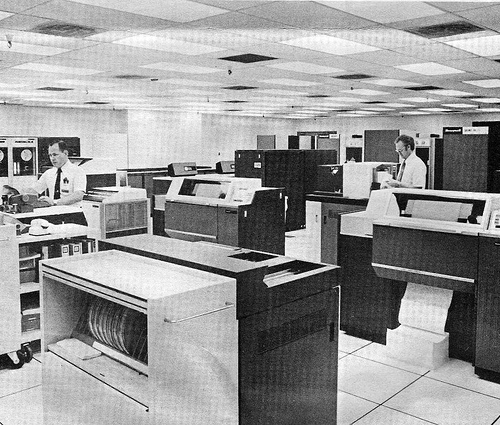The Net Generation (born 1977 to 1997), also known as Generation Y or the Millennials, is an ill understood lot. Don Tapscott, noted thought leader on digital technologies, is a real cheerleader for them in his recent book Grown Up Digital.
However, while some of his examples may represent the bleeding edge thought leaders of this generation, almost everything he says is well reasoned and researched. I would suggest this book is a must read for the rest of us who will watch this demographically dynamic generation increasingly dominate all aspects of our society, including business, culture, education, politics and entertainment. Many of us are looking at this generation from the perspective of the previously dominant demographic group known as Baby Boomers or Boomers (born 1946-1964), also known as the TV Generation. I would note that already, the Net Generation outnumbers the Boomers.
Perhaps the defining characteristic of this group is that they are the first generation to have been immersed from birth in digital technologies, such as the internet, computers and online media. Because of this, they are sometimes labelled “digitals“, with others who find these technologies more challenging to even baffling being called “analogues”. The Digitals don’t even think about technology, it is just part of the landscape for them. Analogues, by contrast, either avoid it like latter day Luddites or struggle to keep up with the Net Geners.
I’m part of an interesting hybrid group of people who were born analogue but has adopted many of the digitals characteristics. In essence, people like me might be described as a digital immigrant. Consider my digital pedigree:
 I first used computers at age 14, after being invited with a set of Math Contest winners to the University of Waterloo where I had the pleasure of using APL an early math-based timesharing system running on an IBM 360/44 . It is notable that, rather than learning the standard Fortran and programming on punch cards, I started programming using an IBM 2741, which is like an online IBM Selectric typewriter (typeball and all) connected via modem, with acoustic coupler, at 134.5 baud. Prior to this, I had read about computers and thought about them abstractly, but the plain truth is that computers were only accessible to a very small, privileged elite.
I first used computers at age 14, after being invited with a set of Math Contest winners to the University of Waterloo where I had the pleasure of using APL an early math-based timesharing system running on an IBM 360/44 . It is notable that, rather than learning the standard Fortran and programming on punch cards, I started programming using an IBM 2741, which is like an online IBM Selectric typewriter (typeball and all) connected via modem, with acoustic coupler, at 134.5 baud. Prior to this, I had read about computers and thought about them abstractly, but the plain truth is that computers were only accessible to a very small, privileged elite. Recently, a friend sent me the directory listing of an old backup tape for the Honeywell 6050 TSS system which reminded me that I first used email in 1975. Yes, we even had mailbox and mbox files way back then. Of course, the email system only connected the almost 1000 users of this computer, yet barely two years later my friend Bill Pase then working at IP Sharp Associates, connected me into a truly global email system run by that pioneering firm. This is primarily of interest because many people I talk to assume that email began in the late 1990’s.
Recently, a friend sent me the directory listing of an old backup tape for the Honeywell 6050 TSS system which reminded me that I first used email in 1975. Yes, we even had mailbox and mbox files way back then. Of course, the email system only connected the almost 1000 users of this computer, yet barely two years later my friend Bill Pase then working at IP Sharp Associates, connected me into a truly global email system run by that pioneering firm. This is primarily of interest because many people I talk to assume that email began in the late 1990’s. Around 1990, while CEO at MKS, I remember being at an X/Open meeting in Rome (where ironically, I ran into the self same Don Tapscott at the Capella Sistina of all places) we were working to develop many of the standards that would shape our modern, connected digital world. I vividly recall after hours discussions with other attendees about my misgivings about how an always-on, multi-media world would impact our overall quality of life. As you can imagine, Rome was a fantastic place to have that debate. Even more important, what was esoteric futuristic thinking 20 years ago has largely come true, for better or worse.
Around 1990, while CEO at MKS, I remember being at an X/Open meeting in Rome (where ironically, I ran into the self same Don Tapscott at the Capella Sistina of all places) we were working to develop many of the standards that would shape our modern, connected digital world. I vividly recall after hours discussions with other attendees about my misgivings about how an always-on, multi-media world would impact our overall quality of life. As you can imagine, Rome was a fantastic place to have that debate. Even more important, what was esoteric futuristic thinking 20 years ago has largely come true, for better or worse.
So, like Don Tapscott, having grown up with a constant backdrop of technology and really having been part of making this cultural form, I too am a cheerleader for this emergent generation. However, many others, the most famous being Mark Bauerlein, take a much dimmer view of this generation. His book The Dumbest Generation: How the Digital Age Stupefies Young Americans and Jeopardizes Our Future (Or, Don’t Trust Anyone Under 30) might well be the NetGen equivalent to Reefer Madness for the boomers. For me, this shows that many people totally misunderstand this talented generation. Sure, this generation has its flaws like any other, but like Don Tapscott, I’m pretty optimistic about it.
To give a taste of how fundamental, not to mention transformational, the Net Generation culture is, I list the 8 norms that Don Tapscott found and validated through his research. I would suggest that the following norms need to be underestand by the rest of society so that the generations can build bridges based on the strengths of each constituency. The alternative is to create a new generation gap based on misunderstandings, a neo-Luddite situation if you will.
Here are Don Tapscott’s 8 norms for the Net Generation:
- Freedom: this generation demands the freedom to choose at work, in education and the marketplace. And, for them, freedom is so ingrained that it is not an option.
- Cutomization: Growing up with computers and software, has made this the mashup generation. Everything from products to lifestyles can be customized. This generation is the living proof of Chris Anderson’s Long Tail phenomenon.
- Scrutiny: Living in the epicentre of the blogosphere, twitterverse, SPAM and nonstop marketing, high levels of filtering and scrutiny are the only defence of a generation which has made separating the signal from the noise an artform.
- Integrity: The laser beam clarity and transparency of an always-on, Google-indexed world has heightened this generation’s radar for anything that fails to ring true. When there is no place to hide, a lack of integrity becomes glaringly obvious with often severe consequences for people or companies who fail to understand this new reality.
- Collaboration: A generation that grew up on group work and online games, now has adopted global collaboration and teamwork like never before. The Net Generation’s digital connectivity likely are another nail in the coffin for command and control organizational design not to mention one-way traditional education models.
- Entertainment: Net Geners expect work to be fun and the line between work and play is much more blurry for this generation. This means that some of the pioneering approaches at the Googleplex, may well become mainstream in the coming years.
- Speed: Among fellow computer geeks, many used to pride themselves on speed and belittle the slower blink rate of the old fashioned world. Net Geners have taken this to extreme in their always-on, instantaneous world, expecting immediate feedback on everything they do. This could well be one of the biggest intergenerational challenges.
- Innovation: This is a generation of early adopters, living on the bleeding edge. Not content to have products and ideas pushed to them like 20th Century consumers, they push collaborative, user-generated approaches to even the products they consume.
In business, government or ordinary society, I think we ignore this tidal wave of new thinking totally at our own peril. The first step is to understand this generation. Then, and only then, can our generation harness the incredible energy, idealism, passion and drive to help us all build a better future.
6 Mar 2009
0 CommentsFail To Understand the Net Generation at Your Peril
The Net Generation (born 1977 to 1997), also known as Generation Y or the Millennials, is an ill understood lot. Don Tapscott, noted thought leader on digital technologies, is a real cheerleader for them in his recent book Grown Up Digital.
However, while some of his examples may represent the bleeding edge thought leaders of this generation, almost everything he says is well reasoned and researched. I would suggest this book is a must read for the rest of us who will watch this demographically dynamic generation increasingly dominate all aspects of our society, including business, culture, education, politics and entertainment. Many of us are looking at this generation from the perspective of the previously dominant demographic group known as Baby Boomers or Boomers (born 1946-1964), also known as the TV Generation. I would note that already, the Net Generation outnumbers the Boomers.
Perhaps the defining characteristic of this group is that they are the first generation to have been immersed from birth in digital technologies, such as the internet, computers and online media. Because of this, they are sometimes labelled “digitals“, with others who find these technologies more challenging to even baffling being called “analogues”. The Digitals don’t even think about technology, it is just part of the landscape for them. Analogues, by contrast, either avoid it like latter day Luddites or struggle to keep up with the Net Geners.
I’m part of an interesting hybrid group of people who were born analogue but has adopted many of the digitals characteristics. In essence, people like me might be described as a digital immigrant. Consider my digital pedigree:
So, like Don Tapscott, having grown up with a constant backdrop of technology and really having been part of making this cultural form, I too am a cheerleader for this emergent generation. However, many others, the most famous being Mark Bauerlein, take a much dimmer view of this generation. His book The Dumbest Generation: How the Digital Age Stupefies Young Americans and Jeopardizes Our Future (Or, Don’t Trust Anyone Under 30) might well be the NetGen equivalent to Reefer Madness for the boomers. For me, this shows that many people totally misunderstand this talented generation. Sure, this generation has its flaws like any other, but like Don Tapscott, I’m pretty optimistic about it.
To give a taste of how fundamental, not to mention transformational, the Net Generation culture is, I list the 8 norms that Don Tapscott found and validated through his research. I would suggest that the following norms need to be underestand by the rest of society so that the generations can build bridges based on the strengths of each constituency. The alternative is to create a new generation gap based on misunderstandings, a neo-Luddite situation if you will.
Here are Don Tapscott’s 8 norms for the Net Generation:
In business, government or ordinary society, I think we ignore this tidal wave of new thinking totally at our own peril. The first step is to understand this generation. Then, and only then, can our generation harness the incredible energy, idealism, passion and drive to help us all build a better future.